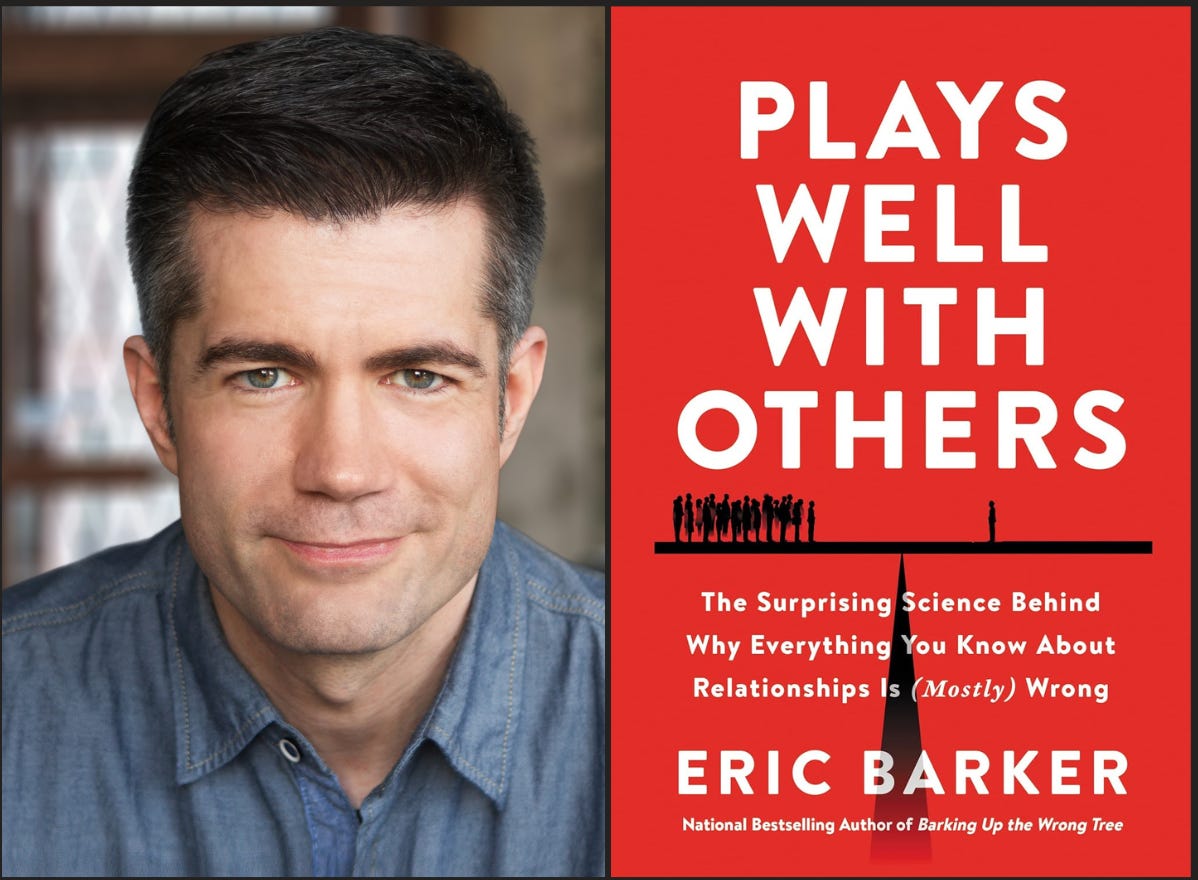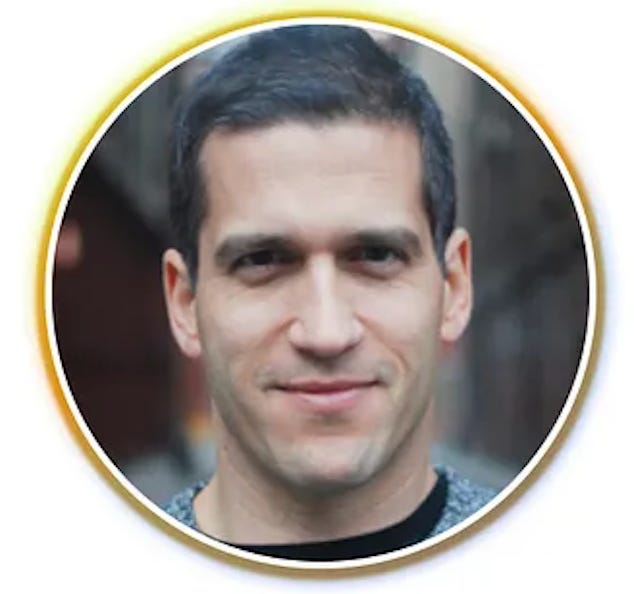Making Sense of the Mess
Eric Barker on science, writing, and why chaos is where the good stuff lives.
Eric Barker is one of those rare nonfiction writers who can make social science feel like stand-up comedy. A one-time Hollywood screenwriter turned blogger turned bestselling author, he’s built a devoted following by mixing real research with sarcasm, skepticism, and sentences that occasionally feature Batman. His first book, Barking Up the Wrong Tree, became a Wall Street Journal bestseller and sold more than half a million copies. His latest, Plays Well with Others, takes a scalpel (and sometimes a sledgehammer) to everything we think we know about relationships. His work has been featured in the New York Times, The Atlantic, and The Financial Times, and his newsletter reaches more than half a million readers each week.
In this Author Insider Questionnaire, Eric talks about bad advice, worse outlines, and the exhausting joy of trying to make readers smarter and laugh at the same time.
21 Questions with Eric Barker
1. What’s the thing most people get wrong about being a writer?
That writing the book is the end of the process. You still have to market the book. It’s like the reward for finishing the marathon is running another marathon. Welcome to the glamorous life of letters. Bring a bullhorn.
2. Hemingway wrote standing up; Edith Wharton, lying down. What are your quirks?
My quirks? Um, I’m going to need a few more pages to answer that
3. Do you read your reviews?
No. But I can always rely on my friends to tell me about the worst ones.
4. Is there a book you wish you’d written?
Plenty. But here’s the thing: I wouldn’t write those books. I’m not wired that way. I don’t have Nabokov’s elegance, McCarthy’s Biblical prose, or David Foster Wallace’s... whatever the hell that was. Writing is an act of personality, and some personalities just aren’t equipped for subtlety, grace, or metaphors that don’t involve Batman. You write what you are. Not what you admire. Not what you aspire to. What you are. The idea of writing someone else’s book is about as realistic as borrowing their spouse and expecting the marriage to go just as smoothly.
5. What keeps you up at night?
My inner monologue shrieking, “They’re gonna hate it. They’re gonna think you’re stupid. You should’ve added that part about the chicken nuggets; it would’ve tied the whole thing together.”
6. Where do you find new ideas?
Relentless, indiscriminate reading and a brain that refuses to mind its own damn business.
I read books, essays, footnotes, shampoo bottles... I read like I’m preparing to blackmail God. You get ideas by being willing to burn down your own certainty. Read until your worldview starts to itch. I have a mind that constantly asks the kind of questions that make dinner parties awkward. (Writing is one of the few arenas where this is not a liability.)
7. How do you keep track of new ideas?
Long lists. Not a bullet journal. Not a Renaissance sketchbook. Not neat, curated, grown-up lists with checkboxes and action steps. More like disorganized, rambling catalogs of half-formed thoughts:
“taxidermy metaphor”
“French Revolution, but it’s high school”
“Dystopian dating app. people matched by enemies”
8. What’s the best piece of professional advice you’ve ever received?
David Mamet said something along the lines of “Don’t have a fallback plan, because if you do, you will.”
9. And the worst?
“Play it safe.”
10. What is the one piece of advice you would give to recent graduates who want to make a living as writers?
Be unique. What readers want is not another voice calmly regurgitating facts in “a professional tone.” They want you. Not the LinkedIn version of you, but the actual you: the slightly neurotic meatbag with opinions and weird metaphors. A person they can follow, trust, and laugh with. Your readers have to feel like they’re spending time with a friend: someone whose company they enjoy, whose mind they want to sit inside for a while. Be the voice someone remembers after closing the book. And for God’s sake, stop trying to sound like someone who might be invited to speak at a TEDx event in Des Moines.
11. Whose career do you most admire and why?
Wile E. Coyote. He was always creative. He never gave up. He made people laugh.
12. What’s on your nightstand right now?
A Medusa of charging cables, the book I’m pretending to read, and a sticky note that says “GO OUTSIDE” which I snooze by turning it over.
13. How did you find your agent?
A much more successful writer who read my blog was kind enough to make an introduction.
14. Coffee, tea, or something stronger?
I don’t care what the urinalysis says, I’m clean.
15. How many drafts before you show your editor?
Technically, the answer is “one,” but that’s profoundly misleading. The outline is where I do all the real work. I front-load all the agony. I don’t iterate; I pre-meditate. The outline is where the violence happens, where the bad ideas get assassinated, the good ones are threatened into cooperating, and the structure is twisted into something resembling coherence. So when I finally write the so-called “first draft,” it’s not a first draft at all.
16. Can you describe your ideal workday?
Wake at 5 AM. Write, hit the gym, write some more, read. Move seamlessly from one to the next with military precision.
17. How does that compare to your actual workday?
No resemblance whatsoever. My day looks more like this: me hunched over my laptop like Gollum, wearing the T-shirt I slept in, pounding on the keys like I’m trying to exorcise demons one typo at a time. My coffee is strong enough to strip paint. My legs are asleep. My stomach is making noises like it’s trying to communicate with whales. Writing is the most majestic form of self-inflicted pain known to humankind, second only to deciding to marathon all the Transformer movies in one sitting because you lost a bet or something.
18. What do you wish you’d known when you were starting out?
The path from here to there will almost never be a straight line. And hoooo-boy, you better be ready to wear many hats. You don’t get to just be a writer. You have to be a writer-entrepreneur-therapist-publicist-designer-influencer-accountant-janitor-SEO consultant-email marketer.
19. Fill in the blank: In five years, successful authors will all be _____
Tired. Existentially tired, ontologically tired. Writing used to be a solitary act. Today? Writing’s the easy part. Now you’re expected to “engage your audience,” and “optimize your platform.” It’s like being a town crier, court jester, and snake oil salesman rolled into one, only with worse dental coverage. Been a long time since Jane Austen got to write books without fretting over her Amazon sales rank.
20. What is your new book about?
My latest book is Plays Well With Others. It’s basically “Mythbusters” for relationships. It’s an evidence-soaked detonation of the feel-good platitudes and interpersonal myths we’ve all been told. It’s based on actual science, not the vague, horoscope-style pseudoscience like “manifesting your soulmate” or “raising your vibration” while burning sage, but real research. Like, actual studies with clipboards and data and people who probably wear glasses. The book takes all that tell-you-what-you-wanna-hear relationship advice you’ve been choking down and replaces it with something like, oh, I don’t know, actual facts.
21. Any new projects the Author Insider community can help support?
I’m always up to something. The best thing they can do is to join my email list, where I write scientific deep dives into various self-improvement topics. It’s like having a pen pal without the awkwardness of actually having to write back.
Thanks to Eric for sharing his thoughts on writing, science, and survival in the creative trenches. To dive deeper into his work, sign up for his newsletter at bakadesuyo.com, and check out Plays Well with Others and Barking Up the Wrong Tree.
Until next time,
— Panio Gianopoulos
Editorial Director, Author Insider & The Next Big Idea Club



